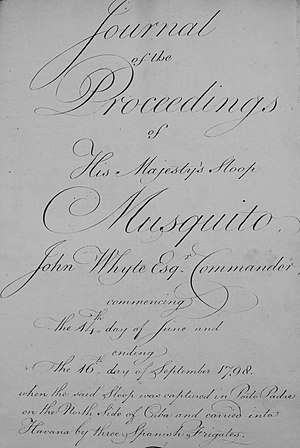HMS Musquito (1798)
HMS Musquito (or Mosquito) was a 16-gun ship-sloop, previously the French privateer Magicienne or Petite Magicienne. The Royal Navy captured her in March 1798. In modern-day English sources, the ship is often mistaken by a schooner of the same name paid off in 1796. After being captured by the Spanish in September 1798, she served in the Spanish Navy and was eventually broken up in 1805.
 | |
| History | |
|---|---|
| Name: | Petite Magicienne |
| Captured: | 1798 |
| Name: | HMS Musquito |
| Acquired: | By capture 1798 |
| Fate: | Captured by three Spanish frigates |
| Name: | Mosquito (alias Ardilla) |
| Acquired: | By capture 1798 |
| Fate: | Broken up 1805 |
| General characteristics | |
| Type: | ship-sloop |
| Tons burthen: | 178 (bm) |
| Complement: | 87 men |
| Armament: | 16 × 4-pounder guns |
Capture

Sailing as a French privateer she was taken on the first day of March, off the coast of Santo Domingo by HMS Valiant,[1] one of the ships that belonged to the squadron of viceadmiral Sir Hyde Parker. Petite Magicienne, which was the ship captured, had a crew of 87 men, some of them mutineers from the frigate HMS Hermione, and mounted sixteen 4-pounder guns.[2] Her captors carried her into the Mole of St Nicholas on the 8th of the same month. There Parker gathered his ships and ordered, few days later, to incorporate Magicienne into the Royal Navy under the name Musquito.[3]
Career and fate
Musquito was commissioned in June 1798 under Lieutenant John Whyte. Parker assigned her a crew of 87 men with the same sixteen 4 pounders that she carried at the time of her capture. Lieutenant Whyte wrote on the Role of the ship that, despite her small dimensions, she was a sixth-rate sloop-of-war.[4] On 20 July she had an incident on Dewee's island with the American brig Unanimity (14).[5]
On 16 September 1798 Musquito was escorting a small convoy off the north coast of Cuba when at daybreak she sighted some strange vessels. When it became apparent that the vessels were frigates and that they were not answering private signals, Musquito signaled to her charges that they should flee. She herself made for Puerto Padre, with the frigates in pursuit. She crossed the bar and anchored just inside. However, when the pursuers crossed the bar and anchored some 300 to 400 yards away, she surrendered. Her captors were the Spanish frigates Medea (40 guns), Esmeralda (38 guns, flagship), and Santa Clara (38 guns), a squadron commanded by Capitán de Fragata Don Rafael Butrón de Mújica.[6] Although Musquito had a complement of 87 men, at the time of her capture she carried only 64 on board, as Whyte had detached some of its men to secure prizes taken to the enemy, including a Spanish merchant sloop. [7]
Spanish service
On October 1798 she was placed under Teniente de Fragata Benito Prieto as the 16-gun corvette Mosquito (alias) Ardilla. She outsailed the British blockade of La Habana and entered Veracruz shortly after. In late 1804 the ship was recaptured by a British frigate and carried into Jamaica, but as war had not been declared she was returned to the Spanish Navy. Mosquito (alias) Ardilla was finally broken up in 1805.[8]
Notes, citations, and references
Notes
Citations
- "No. 15009". The London Gazette. 21 April 1798. p. 334.
- See Bym, p. 574. Captain Crawley of HMS Valiant gave his report to Parker on 8 March 1798 at Cape Nichola Mole. ... after a five hours, he wrote to Parker, I came up with & captured La Magicienne, French corsair of sixteen guns and eighty-eight men, and it being hinted to me that James Mason, late Carpenter's Mate of His Majesty's ship Hermione...
- Vela, p. 57.
- Vela: Presas de la Armada Española 1779-1828, p. 59, footnote. The National Archives, ADM 36/12001. Musquito's navigation Musters Roll.
- Naval Documents Related to the Quasi-war Between the United States and France, 02/1797-12/1802, Vol.2
- Vela, p. 57
- TNA, ADM 51/1265, HMS Musquito Journal of Proceedings. See also Vela, p.60. The Master of this Spanish merchant sloop advised Whyte to set its course towards Puerto Padre the day before, to prevent being taken by the referred Squadron.
- Vela, p. 60
References
- Hepper, David J. (1994). British Warship Losses in the Age of Sail, 1650-1859. Rotherfield: Jean Boudriot. ISBN 0-948864-30-3.
- Bym, John D. (2009). Naval Courts Martial, 1793-1815. Ashgate Publishing, Ltd.
- Vela, Rubén E. (2017) Presas de la Armada Española 1779-1828: listado de buques apresados e incorporados a la Real Armada por apresamiento. ISBN 1-86176-030-2